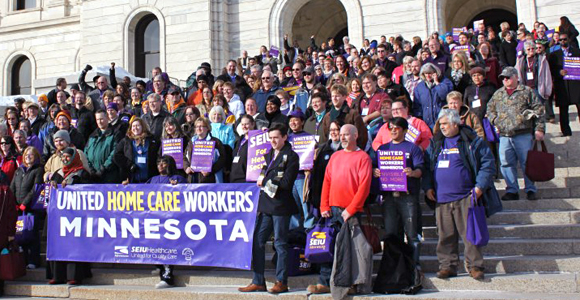

Share
Workers in Minnesota and other states say they will continue organizing, despite Monday’s U.S. Supreme Court decision that imposes some limits on how unions are financed.
“No court case is going to stand in the way of home care workers coming together to have a strong voice for good jobs and quality home care,” said Mary Kay Henry, president of the Service Employees International Union.
The court decision, Harris v. Quinn, centered on the question of whether SEIU could collect a fee from Illinois home care workers who object to being affiliated with a union. In a 5-4 decision, the Supreme Court ruled the practice violated those workers’ First Amendment rights. The result is the workers will enjoy the benefits of a union contract without paying for representation.
The decision affects only those workers whom the court defines as “partial public employees,” a group that includes home care and child care workers who have two employers – their clients and the state that funds their services.
The Harris v. Quinn ruling did not – as some had feared – impose broader limits on worker rights. In that respect, it was a victory for workers and their unions.
Minnesota home care workers, who care for seniors and people with disabilities in their homes, have been organizing for several months and hope to hold a union election soon.
“This ruling will not stop the home care workers in Minnesota who are joining together to form a union to raise our wages, have a voice on the job, and improve conditions in the healthcare field,” said Sumer Spika, a home care worker from St. Paul.
“Our state faces a looming workforce crisis in public home care programs, and this decision will not stop home care workers from fighting to ensure quality care for all Minnesotans. Forming a union will help workers while also protecting the rights of the elderly and people with disabilities by allowing them to remain in their homes.”
The Harris v. Quinn decision also may help Minnesota child care workers move ahead in their quest for a voice on the job. The 8th Circuit Court of Appeals has held up a drive by child care workers to join AFSCME, the American Federation of State, County and Municipal Employees, pending the outcome of the Harris v. Quinn case. Workers are hopeful the court will now allow their effort to go forward.
“Justice won’t be served until child care providers can vote on whether we want a union,” said Clarissa Johnston, a pro-union child care provider from Mounds View. “When providers choose to join a union, we gain a voice on the job. We pay our dues to make our union strong. That gives us the power to get the fair compensation we deserve. We close the income gap and we lift our families out of poverty.”
Latest data show the United States has 1.14 million personal care aides and 807,000 home health care aides. Another 600,000 are estimated to work in child care. The vast majority of both home health care and child care workers are women.
Nationally, the average yearly salary for home care workers and child care providers is about $20,000.

